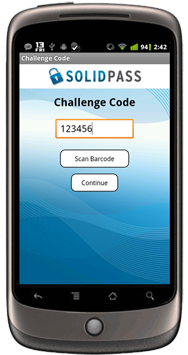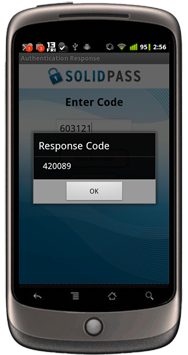Mutual Authentication (Two-Way Authentication)
The SolidPass security token supports mutual authentication and thus the non-repudiation of digital transactions. Mutual authentication, also referred to as website-to-user authentication or site-to-user authentication, is the process of a user or client authenticating themselves to a server followed by the server authenticating itself back to the user. This is so that both parties are assured of each others' identity. Mutual authentication, also known as 2Way authentication, helps prevents man-in-the-middle attacks and the non-repudiation of transactions which is critical for online banking security. Mutual Authentication in transactions is achieved by using Transaction Data Signing (TDS) and invoking Challenge Response mechanisms.
SolidPass works on a number of different platforms. The mobile platforms supported are as follows:
- Android
- Blackberry
- Brew
- iPhone
- Java ME
- Linux
- Palm
- Symbian
- Windows Mobile
The Desktop Operating Systems and Browsers supported are:
- Toolbar Token
- Java Token
- Linux Token
- Mac Token
- Windows Token
SolidPass supports the following authentication methods:
- Event-based One-Time Password (OTP)
- Time-based One-Time Password (OTP)
- PIN control mandatory/optional
- Security Question
- Challenge-Response
- Transaction Data Signing (TDS)
- Mutual Authentication
Software Token Embedded
SolidPass is a software token built
such that it can be used as a standalone product or embedded
in mobile applications such as mobile banking.
Consequently mutual authentication can be embedded into mobile
applications.


